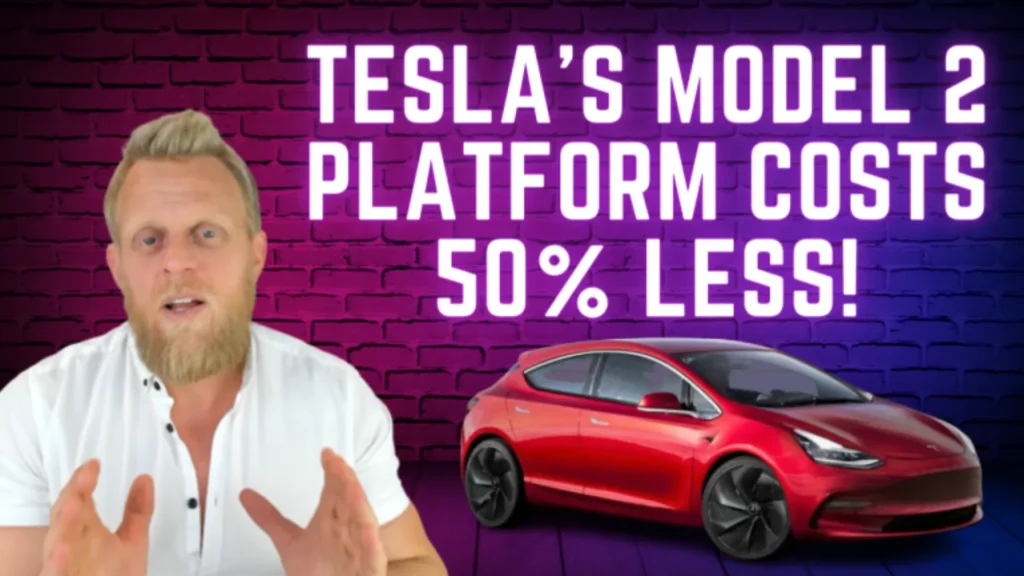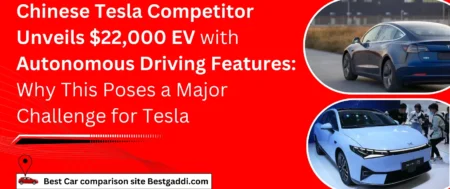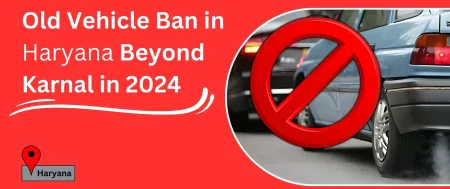Elon Musk calls a $25,000 human-driven Tesla “pointless,” focusing on a self-driving future. Learn why Tesla is shifting away from affordable, human-operated EVs.
Table of Contents
Elon Musk Declares Building a $25,000 Tesla for Human Drivers is Now ‘Pointless’
Elon Musk, Tesla’s CEO and an influential figure in electric and autonomous driving technologies, recently surprised the automotive world with a bold statement. Musk claims that producing a $25,000 Tesla that’s meant for human drivers has become “pointless.” This declaration has caught attention across the industry, challenging long-held expectations about Tesla’s plans for an affordable model. So, why does Musk believe building such a car is unnecessary? Let’s dive into his reasoning and examine the implications of Tesla’s shift towards an autonomous future.

Background on the $25,000 Tesla
Why the $25,000 Tesla Concept Was Popular
The idea of a $25,000 Tesla has been on the table for a while, generating excitement among Tesla fans and potential EV buyers alike. An affordable Tesla model could bring the company’s advanced technology to a broader audience, making electric vehicles (EVs) more accessible and bringing more households worldwide into the fold of green transportation. Originally, this model seemed like an excellent way to bridge the gap between high-end EVs and more affordable options, promising a future of sustainable mobility for the average consumer.
Tesla’s Plans for Affordable Models
For years, Tesla has focused on reducing production costs to make its vehicles more budget-friendly. The $25,000 model was envisioned as Tesla’s most economical car yet, designed to allow more people to access the brand’s cutting-edge technology. This aligned with Tesla’s core mission to accelerate the world’s transition to sustainable energy. However, Musk’s latest statements suggest a significant shift in Tesla’s priorities, moving away from budget models for human drivers towards a fully autonomous driving future.
Musk’s Vision for Autonomous Driving
The Shift to Self-Driving Technology
Elon Musk has long been a vocal supporter of autonomous driving, envisioning a future where human-driven cars become obsolete. In Musk’s view, autonomous cars promise to be safer and more efficient than human-operated vehicles. Tesla has been investing heavily in self-driving research, aiming to make fully autonomous vehicles the standard. This shift towards autonomy indicates that Tesla’s future is less about creating budget-friendly cars for human drivers and more about developing the most advanced autonomous technology possible.
Tesla’s Autonomous Progress
Tesla has made significant progress in autonomous driving technology, with features like Autopilot and Full Self-Driving (FSD) leading the charge. While FSD is not yet fully autonomous, each update inches it closer to achieving this goal. Musk’s emphasis on autonomy signals Tesla’s commitment to staying at the forefront of technological advancements, which could explain why a human-driven, budget Tesla may no longer align with the company’s broader vision.
Why a Human-Driven Tesla is Now ‘Pointless’
Musk’s Rationale
Why does Musk see a human-driven, affordable Tesla as unnecessary? His reasoning lies in Tesla’s anticipated advancements in autonomous technology. Musk believes that within a few years, Tesla’s vehicles will reach a level of autonomy that eliminates the need for human drivers. In his view, producing a budget model primarily for human drivers would be a step backward, as it doesn’t support Tesla’s ultimate goal of fully autonomous mobility.
Benefits of Autonomous Cars
Autonomous vehicles offer numerous benefits, from enhanced road safety to reduced traffic congestion. By removing human error, autonomous cars could significantly reduce the number of accidents. Additionally, self-driving cars can optimize routes and potentially lower emissions by minimizing stop-and-go driving, improving both convenience and environmental impact.
The Impact of Autonomous Driving on Affordability
Cost Implications of Self-Driving
One might wonder if adding autonomy makes cars more expensive. While autonomous technology can increase initial costs, Musk envisions a future where these costs are balanced by the car’s potential benefits. Autonomous vehicles, for example, can serve as “robotaxis” when not in use, potentially generating income for their owners. This dual purpose could make the initial expense more palatable and redefine what it means for a car to be affordable.
Making Electric Vehicles Accessible
Instead of focusing on a low-cost model, Tesla aims to make electric and autonomous mobility accessible by maximizing value. If autonomous cars become the norm, the car’s ability to generate revenue could offset its initial cost, changing the perception of affordability. Musk believes this new model could offer consumers better long-term value compared to simply lowering the price.
Public Reaction to Musk’s Statement
Fan Reactions and Criticisms
Predictably, Musk’s statement has led to a mix of reactions. Some Tesla enthusiasts who were looking forward to an affordable model for personal use have expressed disappointment. These fans see Tesla as a brand that democratizes green technology, and they now question if the company is moving too far from its original mission.
Market Speculations and Concerns
Investors and market analysts are also debating the impact of Musk’s shift. While some see this pivot as a bold strategy that could solidify Tesla’s leadership in autonomy, others worry about the implications for the affordable EV market. With other brands focusing on budget-friendly options, Tesla could risk losing customers to competitors who deliver lower-cost electric vehicles.
Autonomous Driving Challenges
Regulatory and Safety Hurdles
Although the prospect of fully autonomous vehicles is exciting, there are significant challenges Tesla and the industry still face. Regulatory approval for self-driving technology remains a major obstacle, with varying standards across regions. Additionally, safety and liability concerns continue to pose questions that the autonomous driving industry will need to address.
Technological Roadblocks
Even with advanced AI, achieving full autonomy for a vehicle that can handle all possible driving scenarios is a daunting task. Tesla is progressing steadily, but limitations remain, especially when it comes to unexpected or complex driving conditions. Overcoming these challenges is essential for making fully autonomous models a reality.
The Future of Tesla’s Product Line
Upcoming Autonomous Models
Tesla is likely to focus more on releasing autonomous-ready models in the near future, positioning itself at the forefront of the industry. While human-driven cars may remain for a time, autonomous models are expected to take the spotlight. The company’s product line will likely continue shifting towards vehicles designed exclusively for self-driving.
Focus on Innovation Over Cost
Musk’s recent statement suggests Tesla is less interested in producing “cheap” cars and more committed to leading the industry in innovation. Tesla’s future models may prioritize advanced technology rather than cost-cutting, underscoring its focus on autonomous driving as the ultimate goal.
Conclusion
Elon Musk’s statement that a $25,000 human-driven Tesla is “pointless” marks a transformative shift in Tesla’s journey. Rather than concentrating on low-cost vehicles for human drivers, Tesla is betting on a self-driving future that could reshape transportation as we know it. While this move has sparked some controversy, it reinforces Musk’s dedication to a future where technology optimizes every aspect of driving. For Tesla, the focus now isn’t solely on affordability but on fundamentally changing the way we think about car ownership.
FAQs
Why does Musk consider a $25,000 model ‘pointless’?
Musk sees a human-driven, budget Tesla as misaligned with Tesla’s goal of full autonomy.
How does autonomous technology impact EV costs?
Autonomous technology raises initial costs but offers potential long-term savings and income generation.
Will Tesla still make affordable models?
Tesla may shift focus from low-cost human-driven models to affordable autonomous options.
What are the main challenges for autonomous driving?
Key challenges include regulatory approval and overcoming technological limitations in AI.
What’s next for Tesla’s vehicle lineup?
Tesla is expected to focus on fully autonomous models, aiming for innovation over cost-cutting
Will fully autonomous cars be more expensive than traditional models?
Initially, autonomous cars may have higher costs due to advanced technology, but over time, costs could balance out as they become mainstream and offer potential income-generating opportunities (like robotaxi services).
How close is Tesla to achieving full autonomy?
Tesla’s Full Self-Driving (FSD) technology is progressing rapidly, but true full autonomy depends on further advancements and regulatory approvals, which may take a few more years.
What will happen to Tesla’s current lineup of human-driven models?
Human-driven Tesla models will likely remain available for now, but future releases may prioritize autonomous capabilities as Tesla shifts toward a self-driving focus.
How will autonomous Tesla models impact the car industry?
Tesla’s shift could lead the industry toward widespread adoption of autonomous technology, sparking innovation among competitors and potentially reshaping car ownership and use models.
Will Tesla stop producing vehicles at lower price points?
Tesla may reduce its focus on budget-friendly models for human drivers, instead prioritizing affordable autonomous vehicles that offer added value through features like self-driving capabilities.
Can current Tesla owners expect their cars to become fully autonomous?
Tesla is continuously updating its FSD software, so current owners may benefit from increased autonomy over time, although true full self-driving will depend on hardware capabilities and software advances.
What are the safety concerns with autonomous driving?
Autonomous driving technology aims to reduce accidents caused by human error, but safety concerns remain regarding AI’s handling of unexpected scenarios and edge cases, which are still under development.
Will regulatory bodies approve fully autonomous cars soon?
Regulatory timelines vary by region, and while some areas may adopt autonomous cars sooner, widespread approval will depend on both technological maturity and safety testing.
How will autonomous cars affect the job market?
Autonomous technology may impact jobs in driving industries, though new roles in technology development, maintenance, and AI supervision could emerge to balance the shift.
Why is Tesla focusing on innovation over cost?
Tesla believes innovation in autonomous technology and sustainability will bring long-term value to customers and is prioritizing these goals over reducing upfront vehicle costs.
Official Link: Elon Musk now says it’s ‘pointless’ to build a $25,000 Tesla for human drivers – The Economic Times





